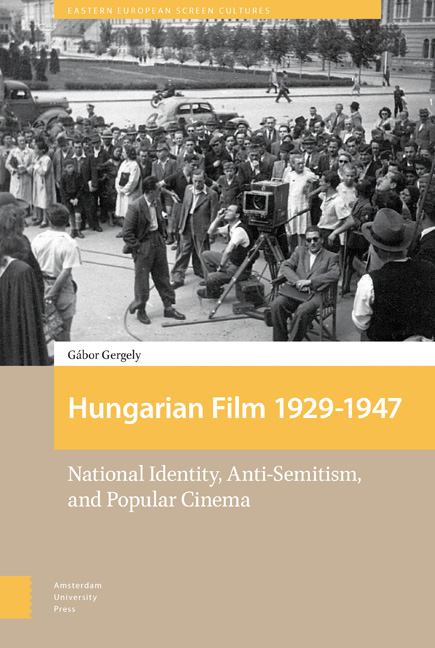Book contents
- Frontmatter
- Dedication
- Contents
- List of Illustrations
- Acknowledgements
- A Note on Accents, Pronunciation, Names, and Spellings
- Preface
- Introduction
- 1 Key Concepts in Pre-1945 Hungarian Cinema
- 2 A Contested Film History
- 3 An Industry Emerges 1931-1935
- 4 Boom, Crisis and Anti-Semitic Reorganization 1936-1941
- 5 From War Boom to Bust 1941-1944
- Epilogue: Industry Reboot and the Myth of a New Start 1945-1947
- Concluding Remarks
- Bibliography
- Index
1 - Key Concepts in Pre-1945 Hungarian Cinema
Published online by Cambridge University Press: 11 December 2020
- Frontmatter
- Dedication
- Contents
- List of Illustrations
- Acknowledgements
- A Note on Accents, Pronunciation, Names, and Spellings
- Preface
- Introduction
- 1 Key Concepts in Pre-1945 Hungarian Cinema
- 2 A Contested Film History
- 3 An Industry Emerges 1931-1935
- 4 Boom, Crisis and Anti-Semitic Reorganization 1936-1941
- 5 From War Boom to Bust 1941-1944
- Epilogue: Industry Reboot and the Myth of a New Start 1945-1947
- Concluding Remarks
- Bibliography
- Index
Summary
A Nation in Search of an Identity
A common starting point for national cinema projects is Anderson's definition of the nation: ‘an imagined political community – and imagined as both inherently limited and sovereign’ (2006, 6). What interests me here is the way in which this definition both works and fails when it comes to the Hungarian nation in the decades that followed Trianon. The definition works, because Hungary was a political community with a specific self-image that can be reconstructed from cultural artefacts. It had borders that firmly limited its geographical extension. And it was sovereign, newly so as a result of the breakup of the Habsburg Empire. However, the definition also fails. Although the nation was imagined as a community, a deep and horizontal comradeship despite the inequalities and oppressions that continued to prevail (Anderson 2006, 7), it was imagined as extending beyond its abstract limits. Hungarians denied the very real and traumatic boundedness of the nation, and imagined the nation stretching far beyond the borders where its neighbours began in their own imagining of themselves, underpinned by the binding international treaties to which Hungary was signatory. In this sense, the Hungarian political community was imagined as extending beyond illegitimate limits. Hungary imagined itself as extending over a plane into which other nations also projected themselves. It imagined itself unlimited by its and its neighbours’ legitimate borders. This unlimited imagination is given expression in the satirical slogan: Borneó és Celebesz magyar volt és magyar lesz or ‘Borneo and Sulawesi Hungarian were and shall ever be’.
Furthermore, Hungarians imagined their political community as not sovereign. In official, public, and private discourse, Hungary was represented as a country with no say in its own affairs. Trianon was something that happened to Hungary against its wishes. It was achieved by subterfuge, with cunning ethnic minority leaders pulling the wool over American, French, and British eyes and tricking the world's great powers into overriding Hungarian sovereignty, destiny, and historical justice, even God's Will. The country was represented as incomplete, as a broken shell, practically a corpse, above which ‘Trianon's fat vultures circled […] awaiting our ultimate death’ (in the words of the eponymous Dr István Kovács).
- Type
- Chapter
- Information
- Hungarian Film, 1929–1947National Identity, Anti-Semitism and Popular Cinema, pp. 49 - 72Publisher: Amsterdam University PressPrint publication year: 2017



